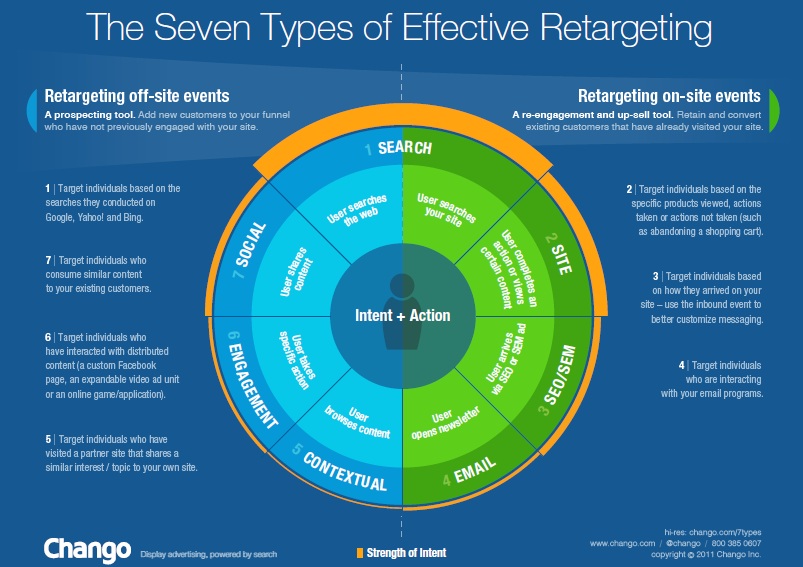Why Search Retargeting Must Be Part of Your Online Marketing Strategy [Infographic]
A guest post by Derek Mabie of Evolve Digital Labs.
Your online marketing strategy has more moving parts than ever, so adding one more to the mix probably sounds like a horrible idea. But having the most successful component to your company’s overall branding and marketing efforts might make it worthwhile.
What Is Search Retargeting?
Branding online is very difficult because users’ general intentions online makes them less receptive to external noise. Branding through the search engines can be costly and time-consuming. It requires an overall company effort.
Search retargeting lets brands market products or services to users who have performed relevant search queries. (Click here to read the long answer to search retargeting.)
Search Retargeting vs. Traditional Retargeting
In traditional retargeting, users’ computers receive cookies from sites visited. These cookies prompt the retargeted ads to display on other sites until the visitors complete a call to action. Search retargeting, however, allows brands to retarget users who have not been to their websites. Instead, the information passed to the ad network is from the search engine. Brands then can reach a much broader audience. Search retargeting delivers a more calculated prospect than a typical display buy.
The infographic below by Chango, a retargeting platform, lists the seven types of retargeting. Chango has assigned a level of intent to each type, which allows brands to become familiar with the purpose and opportunities of retargeting. Though the levels of intent assigned could be debated, the infographic is still a good tool.

Why Should I Incorporate Search Retargeting Into My Online Marketing Strategy?
If you are running a paid search campaign in the engines and have experienced success bidding on industry terms, you may have a CTR anywhere from 1% to 5%. If this is the case for a specific term and say the term in question has 10,000 unique searchers per month, you still have 9,000-plus users who demonstrated high intent but didn’t make it to your website. Search retargeting lets you market your unique message to missed users, away from the competition’s ads. Even pay-per-click (PPC) campaigns with limitless funds cannot perform to this level of persistence.
Another benefit search retargeting offers is the flexibility between CPC or CPM models; the more advanced platforms can operate on a CPA scale as well. Below is a cost analysis from an article on retargeting for high-cost verticals. It clearly demonstrates the ability to drive a similar consumer at a lower cost than with a PPC campaign.
Vertical
Keyword
Approximate CPC per Google
Search Retargeting CPC
Auto
chevrolet
$1.58
$0.94
car dealers
$4.14
$0.72
autos
$1.79
$0.79
toyota
$1.65
$1.29
auto
$3.52
$0.75
Education
online school
$16.19
$0.73
business school
$14.07
$0.96
mba
$19.26
$1.44
online university
$25.26
$0.33
online education
$26.40
$0.55
online degree
$28.61
$0.16
Financial
mortgages
$7.47
$0.64
refinance
$8.01
$0.64
mortgage
$2.63
$0.59
loan
$4.66
$0.51
investing
$7.58
$0.51
Insurance
health plans
$6.84
$0.62
health coverage
$7.55
$0.32
life insurance
$17.15
$0.41
health insurance
$10.20
$0.42
Legal
injury attorney
$43.80
$0.58
lawyer
$10.49
$1.71
divorce lawyer
$13.18
$0.34
mesothelioma
$85.07
$0.26
business law
$3.57
$1.58
Average
$14.83
$0.71
Search retargeting eCPC data is based on actual performance of those terms on Simpli.fi’s platform in October and November 2011.
Targeting with search technology goes beyond keywords from the engines. The advanced retargeting platforms can allow brands to narrow their displays to geotargeted campaigns while keeping within their keyword strategy. Brands then have one more chance to find and present a message to the correct audience. If you represent a brand that offers products to a complicated footprint, search retargeting can be a great money-saver over traditional display. Campaign creative has the option to be dynamic according to keyword and location, so brands can test multiple price points or CTAs to provide optimization opportunities.
For the Nonbelievers
Still skeptical? Consider then that comScore, a leader in measuring digital initiatives, recently announced a new product, Validated Campaign Essentials. The purpose of this product, a measurement system, is to validate digital ad delivery. It also helps assess the value of a placement according to user engagement.
Additionally, The Federal Trade Commission is aware of the impact that search retargeting can have on Internet users. Recently, the FTC started enforcing that brands allow consumers the option of self-exempting from retargeted advertisements online. This measure protects consumers’ privacy and lets them choose whether to opt out of retargeting methods. Read more about the “do not track” release here.
What Is the Strategy of Search Retargeting?
The different strategies depend on your budget and goals. Some brands choose to concentrate on terms that yielded the highest conversion rate percentages in the past. Other campaigns consist of pursuing competitors’ terms.
Whichever approach your brand decides to tackle, do match the advertising message to the searchers’ perspective. For example, if you are targeting competitors’ brand terms, make sure you have ads that compare the service or price, and lead to unique landing pages. Support each page’s authenticity with testimonials. If you are using industry terms, provide a case study or some form of industry validation.
Remember:
Strategies vary depending on which kind of keywords are pursued.
Keep a tight relation between ad messaging and keywords.
Lead visitors to unique landing pages for tracking purposes.
Leverage testimonials as a support.
Search retargeting—like any other form of marketing—takes strategy, time, and application. Measuring becomes a crucial component of improving and determining value. Track the campaigns at creative and keyword levels with your analytic suite of choice.
(Photo courtesy of Bigstock: Search)
Derek Mabie is president of Evolve Digital Labs, a St. Louis-based search agency. He has more than 10 years of experience in digital marketing and has worked with major brands. Derek can be reached at [email protected]
